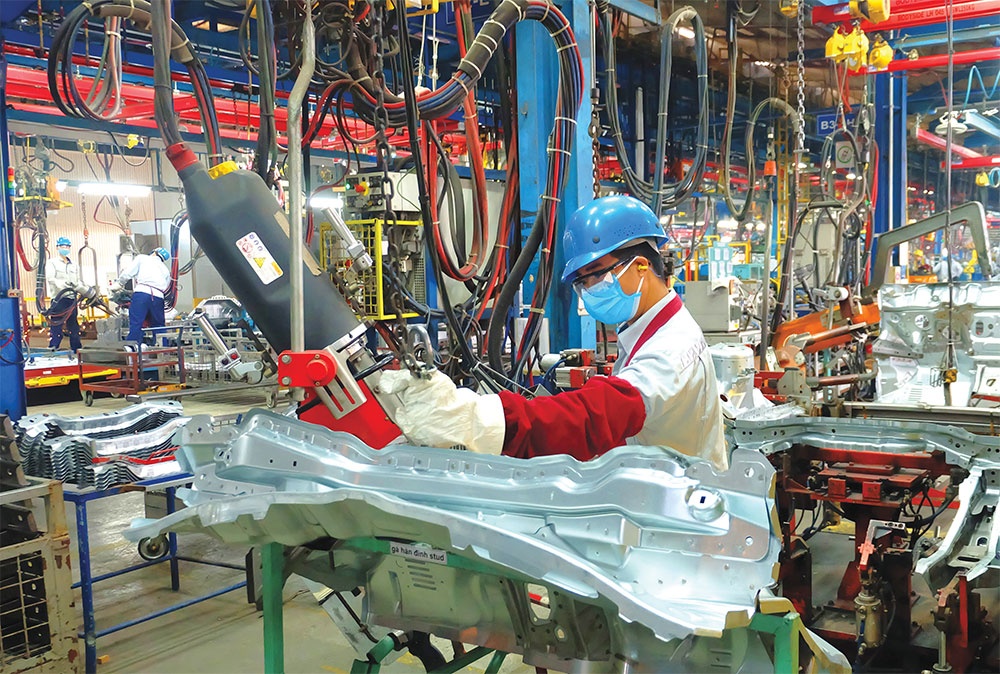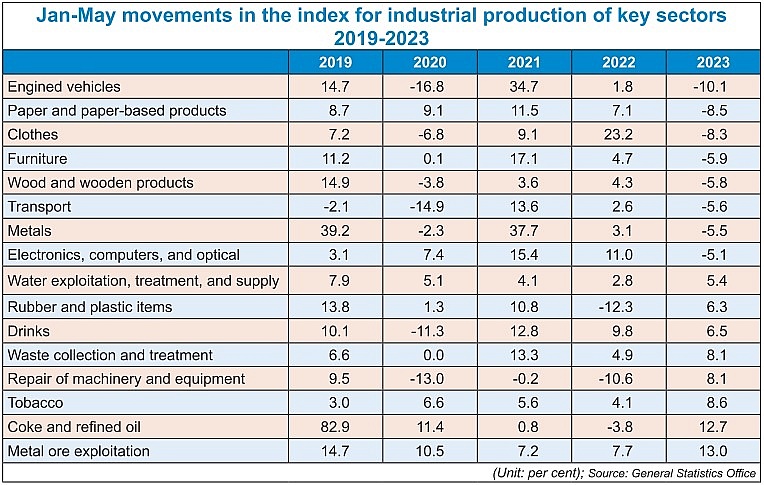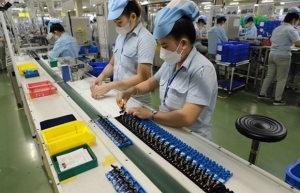Localities double-down on pleas for business support
 |
| Localities double-down on pleas for business support |
Over the past four months, Pham Manh Hieu, a worker from a Japanese furniture maker based in Hanoi’s Noi Bai Industrial Park, has become temporarily unemployed due to his company’s lack of export orders, while his wife also faces the same plight, with her metal producing company operating in moderation compared to previously.
“We are anxious about the future as we need money to cover daily expenses, prices in the market continue to escalate following the recent electricity price hike,” said Hieu, whose family lives in a tiny house rented in Hanoi’s Xuan Dinh area, about 13 km from his work.
“Many companies near mine are operating in difficulties, with a cut-back of working hours and staff,” Hieu said. “My income was about VND8 million ($350) a month, and now it is VND3 million ($130) which is an allowance offered by the company whose leaders said that they don’t want to sack employees for fear that they will not be able to gain them back once the economic conditions recover.”
According to the General Statistics Office (GSO), Vietnam’s five-month index for industrial production (IIP) dropped 2 per cent as compared to the same period last year, when the IIP increased 8.1 per cent on-year. In which, the IIP for the processing and manufacturing sector fell 2.5 per cent against the corresponding period last year, when it rose 8.9 per cent on-year. The electricity production and distribution sector climbed only 0.8 per cent on-year, while the mining sector declined 3.5 per cent on-year, and the sector of water supply and wastewater and trash management and treatment expanded 6.4 per cent.
The IIP of many key sectors also witnessed an on-year reduction, including engined vehicles (10.1 per cent); paper and paper-based products (8.5 per cent); clothes (8.3 per cent); furniture (5.9 per cent), wood and wooden products (5.8 per cent); transport means (5.6 per cent); metal (5.5 per cent); and electronics, computers, and optical products (5.1 per cent).
Nguyen Van Hau, business director at the Japanese furniture company in Hanoi, said that over the past five months, this business has had to apply a cut-back of about nearly 1,000 workers out of 1,500.
“Revenue has slashed by 40 per cent on-year, and the remaining workers have been working in moderation,” Hau said. “The company’s orders from partners within Vietnam and overseas such as Europe, the US, and Russia have also reduced. We are now trying our best to seek more orders to revive production and re-employ those that we have temporarily given a staff cutback.”
 |
Especially complex situation
Commenting on the business and production landscape now, Minister of Planning and Investment Nguyen Chi Dung said at the National Assembly (NA), “All enterprises are now bogged down in problems. How to rescue enterprises out of increased difficulties must be considered the most important task now.”
What counts most for enterprises are that they must have orders because orders will help them boost production and business activities, he added. “However, they are facing numerous burdensome administrative procedures. Many businesses are lamenting that such procedures in many localities are very slow as state cadres don’t want to work and shirk responsibility.”
He also expressed concern that thousands of business conditions have been cut over the past few years, but in some localities, new administrative hurdles have appeared, vexing enterprises.
According to the GSO, in May, there were more than 12,000 newly established businesses nationwide registered at $4.5 billion and employing 74,600 labourers – down 24.2 per cent in the number of enterprises, 32.9 per cent in registered capital, and 37.4 per cent in the number of employees as compared to those in April. These were also down by 9.5 per cent in the number of enterprises, 17.5 per cent in registered capital, and 16.6 per cent in the number of labourers as compared to the same period last year.
In the first five months of this year, Vietnam saw more than 61,900 newly established businesses registered at $24.72 billion, using 405,900 labourers – down 1.6 per cent in the number of enterprises, 25.3 per cent in registered capital, and 7.2 per cent in the number of labourers as compared to those in the corresponding period last year.
The average registered capital per an enterprise in this period reached $400,000, down 24.1 per cent on-year. If the $35.86 billion of additional capital registered by the operational 21,100 enterprises is included, the total registered capital introduced in the economy in the first five months will hit nearly $60.6 billion, representing an on-year plunge of 43 per cent.
Meanwhile, the first five months also saw 55,200 businesses with halted operations; 25,500 enterprises stopped operations and awaited dissolution procedures; and 7,300 enterprises completed such procedures. On average, about 17,600 businesses were kicked off from the market every month.
Over a week ago, the Prime Minister’s Research Committee for Private Economic Development under the Advisory Council for Administrative Procedure Reform submitted a survey over nearly 9,600 enterprises’ performance to PM Pham Minh Chinh, saying enterprises are now facing an especially difficult situation.
Under the survey, 82.3 per cent of respondents said they will have to reduce, halt, and stop operations in the remaining months of this year. In which, 11 per cent are businesses that will stop performance and await for dissolution; 12.4 per cent will suspend operations; 38.5 per cent will strongly slash performance; and 20.5 per cent will reduce operations. Up to 81 per cent of the surveyed firms have had “negative/very negative assessment” about the Vietnamese economic outlook in the remaining months of 2023. Positive assessment accounted for only 4.2 per cent of total respondents.
The biggest difficulties hitting them include shortages of orders (59 per cent); access to bank loans (51 per cent); conducting administrative procedures and meeting legal regulations (45 per cent); and risks of being criminalised in economic transactions (31 per cent).
Many localities’ support has failed to meet realities as up to 84 per cent of enterprises surveyed said the effectiveness in management and support remains poor.
The survey calls for more sturdy actions from the government, ministries, and localities so that more values can be created to enterprises and the entire economy.
Action needed
NA deputy Pham Trong Nghia, representing the northern province of Lang Son, said, “Enterprises are now functioning as the backbone of the economy and as the key contributor of economic growth. But now they are facing massive issues. The government needs to apply stronger solutions to assist them and labourers.”
“However, in order to formulate exact solutions, it is necessary to thoroughly review and study all challenges at home and abroad as Vietnam’s economy is quite open to the world,” Nghia said.
The Vietnamese economy’s GDP was valued at $409 billion in 2022 when total export-import turnover reached $732.5 billion, which was 1.8 times higher than GDP.
Meanwhile, NA deputy Le Thanh Van representing the southernmost province of Ca Mau underlined the need to improve the quality of many state cadres who directly perform administrative procedures.
“The quality of many cadres remains poor, affecting enterprise performance and the economy’s competitiveness,” Van said.
NA deputy Nguyen Manh Hung from the Mekong Delta city of Can Tho also stressed the need for long-term pro-business policies because the domestic demand is now decreasing strongly.
“For example, the VAT will be reduced from the existing 10 to 8 per cent, but it will last only until the year’s end. It is suggested that the reduction level can be 3 per cent and last until mid-2024 so that enterprises’ problems will be lessened and more employment can be generated,” Hung said.
 | Business environment reform is the most efficient support for enterprises: GSO In the face of domestic and international economic difficulties, the most effective support for enterprises is to create an equal, open and transparent business environment, according to Do Thi Ngoc, head of the General Statistics Office (GSO)'s Department of General Statistics. |
 | Hanoi among localities with high public administration performance index The capital city of Hanoi scored over 43.9 points out of 80 in the 2022 Provincial Governance and Public Administration Performance Index (PAPI), which was freshly released by the United Nations Development Programme (UNDP) on April 12. |
 | Further tax support reflecting efforts to empower business The government is continuing to fuel struggling business performance with a new fiscal initiative in an aim to reach its desired economic growth. |
What the stars mean:
★ Poor ★ ★ Promising ★★★ Good ★★★★ Very good ★★★★★ Exceptional
Related Contents
Latest News
More News
- Masan Consumer names new deputy CEO to drive foods and beverages growth (February 23, 2026 | 20:52)
- Myriad risks ahead, but ones Vietnam can confront (February 20, 2026 | 15:02)
- Vietnam making the leap into AI and semiconductors (February 20, 2026 | 09:37)
- Funding must be activated for semiconductor success (February 20, 2026 | 09:20)
- Resilience as new benchmark for smarter infrastructure (February 19, 2026 | 20:35)
- A golden time to shine within ASEAN (February 19, 2026 | 20:22)
- Vietnam’s pivotal year for advancing sustainability (February 19, 2026 | 08:44)
- Strengthening the core role of industry and trade (February 19, 2026 | 08:35)
- Future orientations for healthcare improvements (February 19, 2026 | 08:29)
- Infrastructure orientations suitable for a new chapter (February 19, 2026 | 08:15)

 Tag:
Tag:



















 Mobile Version
Mobile Version